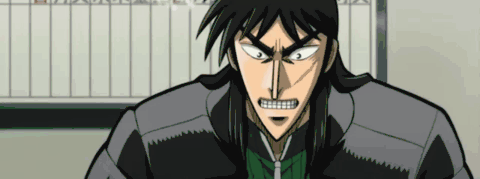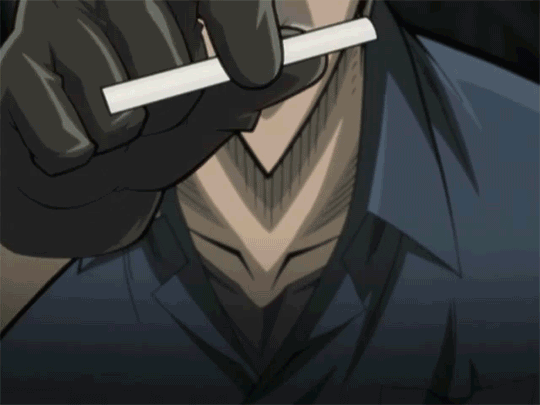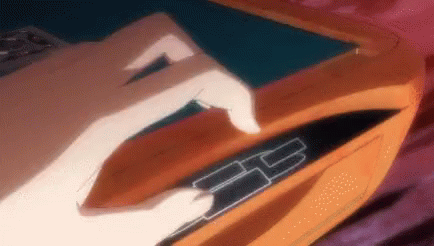Mahjong
It's time for a mahjong post. I have a lot to write about. To be clear, I'm talking about Riichi Mahjong. Not mahjong solitaire, and not Chinese mahjong. This is Japanse mahjong.
For those unfamiliar:
Mahjong is a tile-based game that can be played on a table. Everyone has a row of tiles (a
hand), and takes turns drawing tiles from thewalland discarding tiles from their hand. Your hand is hidden from other players. The goal is tocompleteyour hand (by fulfilling certain conditions) before other players can, without dealing into their hand through your discards. Thus, it's a balance of attack and defense. Of course, it gets a bit more complicated than that; but I think that's the heart of mahjong.
The origin of my interest

It all begins with Kaiji: Ultimate Survivor, a gambling anime. This isn't a post about Kaiji, so I'll refrain from going into detail, but I very much enjoyed it. It isn't a full adaption of the manga, so after the anime I continued on to the manga. One of the arcs is about a gambling game based on mahjong, albeit with many changes to it. Still, it piqued my interest and I wanted to better understand it. This wasn't enough for me to dive deep into learning the full game, but I enjoyed the author's work so much that I wanted to read what else he had made. And his other works happened to be full of mahjong. Real mahjong. Alright, now I was going to learn it for real.
Learning resources
The most useful resource I had was Light Grunty's videos. There are a lot of videos, but they're fairly short and easy to understand. (Fun fact: I later met him in real life, by chance. Funny how that happens.)
Of course, learning is much faster when you can put it into practice. I purchased Kemono Mahjong for Android and started playing. It has a handy tutorial and is easy to use for new players, so it was the perfect way to get my feet wet. The characters are cute, too.
From there, I began to read Akagi.
Akagi

I love Akagi; both the manga itself, and the character (he's quite a cool, and perhaps edgy, character, but he has a surprising amount of depth). I recall Light Grunty saying that the games were way too unrealistic, and I get that. Akagi is sometimes absurd. But it still excited me, and I adored the character dynamics. I see it more like a fantasy story. There are these elements of magic, where a character's luck is somewhat tied to their will and mental state; but that makes it much more interesting to me. If it were as luck-based as actual mahjong, then the results of matches would have to be decided at the whimsy of the author. But because some aspects of luck are driven by the characters, it therefore becomes more logical even if less realistic.
Now, to give it some criticism, the manga was quite drawn out. Actually, it went on for almost thirty years (though I read it around the time when it ended, so I didn't have to wait for updates). I can only imagine what it may have been like to spend much of your life experiencing this story unfold. The author manages to draw out one game for, I think about 90% of the manga. Though it was repetitive at times, this gives the characters a chance to intimately know each other; making the way things end all the more powerful. Don't worry, I won't spoil anything.
After reading Akagi, I may have read Ten or Gin to Kin next. Those are other works by this author, both of which involve mahjong (though the mahjong in Gin to Kin is for a much smaller part of the story).
Going to the next level
I started playing against real players online on Tenhou. It was fun climbing the ranks in a competitive environment, and it was a completely different feel from facing off against A.I. Note: Light Grunty has a video on how to play Tenhou in English, check it out if you're interested.
Then, I found a meetup in real life where I could play. I was intimidated, but also excited. Playing online was fun, but I wanted to know what it was like to truly touch the tiles with my own hands and slide them against the table just as I saw in Akagi.
When I arrived, everyone was very kind. Playing in real life is much more difficult than online because you have a lot more to keep track of; the game won't display scores for you (unless you have a fancy type of automatic table, which were there but generally limited to the experienced players. I did get to use it later on), and you're expected to swiftly handle your tiles. Players have various responsibilities when it comes to setting up the game, though automatic tables make things a little easier. But in any case, the people there were happy to help teach me. I consistently messed up, but I stuck with it and learned a lot. Many of the people I played with took the game very seriously and wanted to even play professionally in Japan. Although my own interest was more one of curiousity, and of a love for Nobuyuki Fukumoto's works, I did my best to match the level of those around me.
One thing that helped me memorize the symbols on tiles was reading Akagi and speaking out what each tile was, then I'd double-check a tile chart to see if I got it correct. Although there are variations of tiles that have numbers/letters on them, the tiles we use in person didn't have them. And, anyways, it's very useful being able to instantly recognize the pattern on a tile without needing to search for the number.
I read the entirety of the highly-acclaimed Riichi Book which took me deeper into the strategies of the game.
I continued to consume other forms of mahjong content; the Akagi anime and live-action show, and the wildly entertaining Saki.

MahjongSoul
At some point, MahjongSoul officially released in English. Just like Tenhou, you can play online against other players; but now with cute and sexy anime characters. Although I liked the minimalism of Tenhou, I got hooked on the stylishness of MahjongSoul. It has some features that make it a bit more beginner friendly, which could be a turn-off for more experienced players who want less training wheels, but I was fine with this. When the pandemic hit, I stopped going to the real-life meetup; and the more casual play of MahjongSoul became a relaxing way to spend time. By now, I'm probably quite rusty and would need to get used to playing in real life again. I'm not particularly interested in going back, to be honest. I had a great experience there, but there are other things I'd rather dedicate my time to now.
Back to MahjongSoul, one of the things I like about it more than Tenhou is the gamemodes. There are temporary gamemodes during events that make you rethink how you play. You can always play classic riichi mahjong, but new gamemodes really spice things up.
Philosophy
Mahjong helped me to become more patient. Sometimes you keep drawing tiles and your hand isn't progressing. Sometimes you want to go for a cheaper hand because you're scared someone else will win first. But, sometimes waiting things out and going for extra points makes all the difference. At the end of the day, it's all a gamble. It's possible to make the most "statistically correct" decisions and still lose, but that doesn't mean you did anything wrong. There's a lot of luck involved. That's mahjong.
"That's mahjong." is something I would often repeat to myself in my head when something unfair seemed to happen. You may have started out with an amazing hand, then lost it to something small and insignificant from another player, but that's mahjong.
I see mahjong through the lens of stoicism. Your hand does not belong to you. You are not owed a win just because your hand is good. And, at any moment, you need to be capable of destroying that hand by folding. Even if you don't fold, your hand can become nothing in an instant; and you must make peace with that.
"I simply have to make this tile pass." is nonsense. If you deal in, that round is over and your hand is dead. It might sound obvious, but reminding myself about these simple things helps me play with a cool head.
My goal is to do the best I can with the hand I'm given, whether that means choosing to push or choosing to fold. But if you're lucky, even a terrible hand can become worth enough to change the tides of the game.
At one point, I may have had many high-value tiles (dora) in my hand and thought it would be a waste to fold. But now, I see it as being greatly beneficial. Knowing where the high-value tiles are gives you a lot of valuable information, because you know that your enemy doesn't have those tiles. If I were to keep pushing unnecessarily, when I know I would deal in, then it would truly become a waste.
"Just play how you always do." If you can't win a hand, you might play in a riskier way even when it doesn't make sense to. If I've lost a few games, I'll remind myself to stay consistent and not switch up my playing style just because I'm frustrated. Well, I don't really get frustrated anymore; but this helped me a lot when I was new. Of course, you might learn new things and therefore change your playstyle because of that. That's fine. Just don't do it based on pure emotion.
Lastly, Light Grunty would always say to have a reason for everything. Why did you discard this tile instead of that tile? Different people may have different answers, but if your answer is "I don't know." then you might want to think things through a little more.
Conclusion
Well, thanks for reading all the way to this point (unless you skipped here). I discussed my journey of learning mahjong, the resources I found useful, and the philosophy that has bled from the game into my every day life. Many things in life might come down to luck, but we have the power to influence that luck and give ourselves the best shot we've got at winning. Sometimes things might not work out, but that's life. That's mahjong.